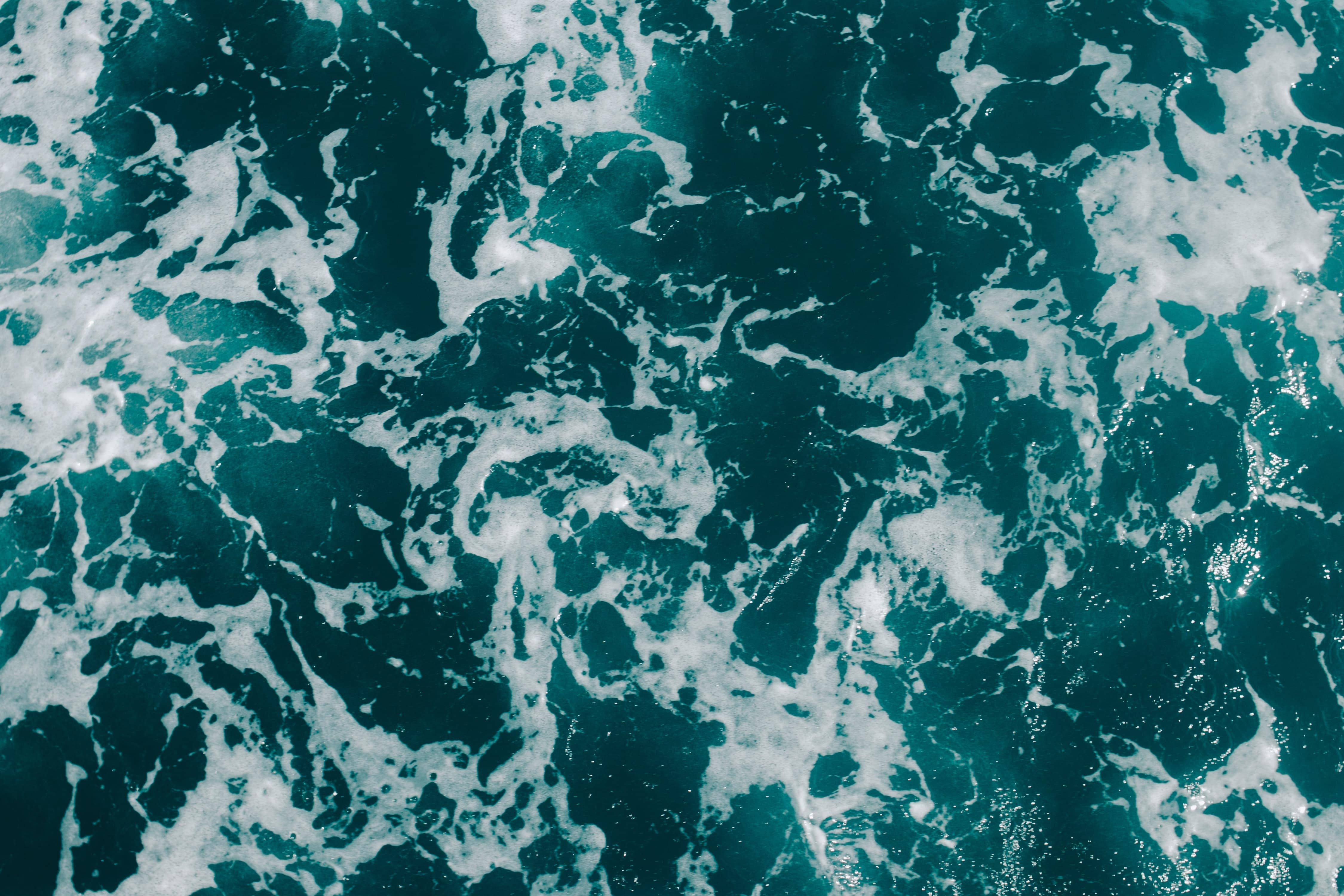Moérie is here to help with thin, damaged, slow-growing hair
Everyone’s hair is different. Tell us a bit about yourself to see if we can help you.






Many people love how their hair looks and feels after a day of swimming in the ocean. They rave about the volume, texture, hair growth, and beachy waves that salt water creates, claiming that it gives their hair a natural, effortless look. But is salt water good for your hair?
Some people avoid sea water entirely, believing it damages their hair. They worry that the high salt concentration will strip their hair of its natural oils, leaving it dry, brittle, and prone to breakage.
So, what’s the truth? Well, salt water is a bit like a double-edged sword. In this article, we’ll take a closer look at the benefits and drawbacks of salt water for hair and how to protect your hair after a day at the beach.

Salt water is a solution of water and various salts, such as sodium chloride, magnesium, and potassium. It’s found naturally in oceans, seas, and some lakes.
Salty water can create a natural texture and wave in the hair, adding volume and body. The salt can also help to exfoliate the scalp, removing dead skin cells and promoting healthy hair growth.
However, the high salt concentration can also dehydrate the hair and scalp, stripping away natural oils and leaving hair dry, brittle, and prone to breakage. Salty water can also cause color-treated hair to fade more quickly – especially if you go from swimming in the sea to tanning under the hot sun without wearing a hat or a scarf to protect your hair.
Overall, the effects of sea water on hair can vary depending on factors such as hair type, length, and the amount of time spent in the water. Proper haircare before and after exposure to salt water can help minimize any adverse effects and enhance the benefits.

If you’re all about a bit of unruliness in your hair, you like a little curl here and there, and you’re not the type of person who prefers sleek hair – we have good news for you. Sea water might just be your number one solution to achieving effortless beach waves.
Here are some of the benefits of salt water for hair:
Natural texture and waves. Salt water can create a natural texture, extra body, and wave in the hair that’s difficult to replicate with other styling methods. It can give your hair the beachy waves that are perfect for days when you just can’t be bothered to do all the hard work.
Exfoliation. The salt crystals in salt water can help to exfoliate the hair follicles and stimulate blood flow, removing product buildup and dead skin cells and promoting healthy growth. This natural exfoliator can lead to stronger, healthier hair over time.
Volume. Salt water can add volume and body to hair, making it look fuller and thicker.
Natural highlights. Salt water can help lighten hair naturally, creating natural-looking highlights unique to each individual. Who doesn’t love a few peek-a-boo hair strands that complement the tones of your face?
Reduced oiliness. If you’re constantly struggling with greasy hair – sea salt might be good for your hair! The salt crystals in sea water can help regulate sebum production, which is the natural oil produced by the scalp. It can help to balance the scalp’s pH levels and prevent excess oils in your scalp.
Easy maintenance. Salt water or a sea salt spray can create a low-maintenance hairstyle that requires minimal effort. This is perfect for those who want a natural, beachy look without spending hours styling their hair.

We got it – salt water gives you the beach waves of your dreams. But if that’s the case, how come it’s not everyone’s go-to styling method? While it can do wonders, it can also make it hard to understand the craze. That’s because there are some drawbacks that you should consider:
Dehydration. The high salt concentration in sea water can dehydrate hair, leaving it dry, brittle, and prone to breakage. Especially for people with already dry or damaged hair.
Color fading. Salt water can cause dyed hair to fade more quickly, especially if the hair is receiving excessive exposure to the sun after dipping it into salt water. Beware if you’re one of those who spend a lot of time and money on hair color or have chemically treated hair!
Tangling. Salt water can cause hair to tangle and knot more easily, which can be painful and difficult to detangle.
Scalp irritation. Ocean water or sea salt sprays can cause irritation and inflammation on the scalp, leading to discomfort and itchiness.
Buildup. Over time, salt water can build up on the hair and scalp, leaving a residue that can be difficult to remove.
Frizziness. For some hair types, salt water can cause frizziness and flyaways, making hair difficult to manage.

So, you’re tempted to try it out for yourself but scared about the salt water damage? You can surely take some precautions before risking the health of your locks, and here’s how you can do it:
Apply hair oil. Protective hair oil or serum before swimming in salty water can help keep your locks hydrated and prevent damage. Look for a product containing natural heavy oils like argan or coconut oil to help seal moisture.
Wear a swim cap. Wearing a swim cap to the beach can help protect hair from sea salt water’s effects. It creates a barrier between the hair and the water, preventing sea salt and other chemicals from contacting your hair.
Wash your hair with fresh water. After swimming in salt water, wash your hair with fresh cold water as soon as possible. This will help to remove salt buildup and prevent damage. Avoid warm water, as it can make your hair more prone to breakage.
Use a deep conditioner or hair mask. After prolonged exposure to ocean water, use a leave-in conditioner or hair mask to help restore moisture and prevent damage. Look for products that contain ingredients like keratin or amino acids to help strengthen and repair hair.

Overall, taking these steps can help to protect your hair from the potential negative effects of salt water. By properly caring for your hair before and after exposure to salt water, you can enjoy the benefits of a day at the beach without sacrificing the health and beauty of your locks.
Let’s say you’re a surfer, a swimmer, or just a frequent traveler – in those cases, it can be hard to involve all the protective measures in your daily routine simply because it’s time-consuming. What do you do?
If you’re frequently exposed to salty water, establishing a haircare routine is important to help keep it healthy and looking its best. Here are some recommended haircare routines for individuals who frequently swim in ocean water:
Use hydrating shampoo and conditioner. Look for a natural shampoo and conditioner designed to hydrate and nourish hair and scalp – this will help to counteract the drying effects of sea salt and maintain your hair health.
Deep condition regularly. Besides using hydrating shampoos and conditioners, it’s important to deep condition regularly. It will help to restore moisture and prevent damage. Look for a deep, leave-in conditioner designed specifically for dry or damaged hair.
Get regular trims. Frequent exposure to ocean water can cause split ends and breakage. To prevent this, getting regular trims to keep your hair healthy and strong is important. Aim to get a trim every 6–8 weeks.
Protect your hair from the sun. The sun can also cause hair damage, so it’s important to protect your head when you spend time at the beach. Wear a hat or scarf to protect your hair from the sun’s rays.
By following these recommended routines, you can help keep your hair healthy and looking its best, even with frequent exposure to salt water. Remember to also take steps to protect your hair before and after a beach trip, as this can help minimize any potential damage.

While sea salt water can provide some benefits for your locks, it can also have some drawbacks, such as drying out your hair and causing damage. But don’t worry; there are plenty of ways to protect your hair before and after exposure to salt water, from applying oils to wearing a swim cap. If you’re a frequent swimmer, establishing a haircare routine and finding the right hair products are important to help keep your hair healthy.
So go ahead, hit the ocean, give your skin some vitamin D, and enjoy the beach waves; just remember to take care of your hair while you’re at it!





Everyone’s hair is different. Tell us a bit about yourself to see if we can help you.